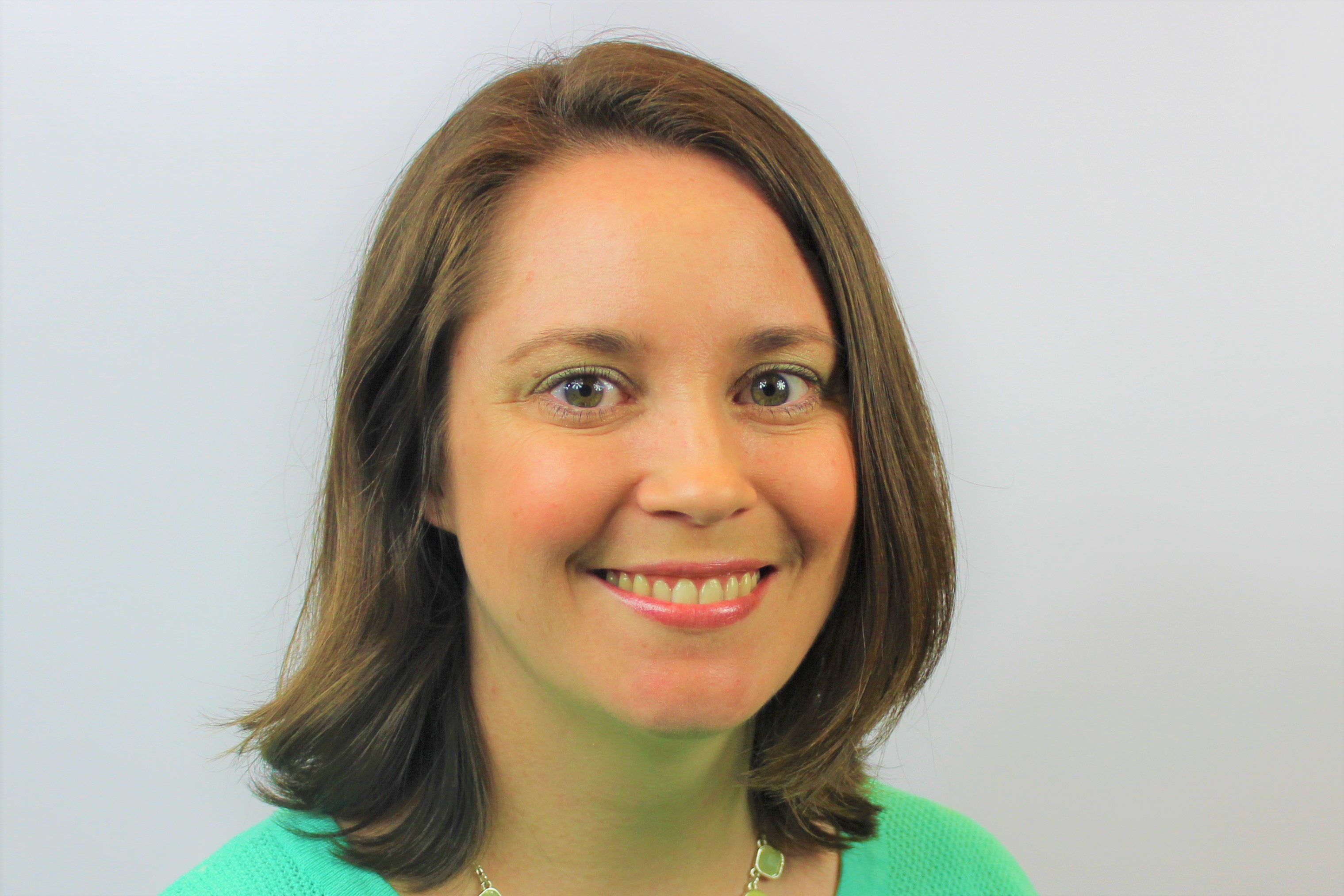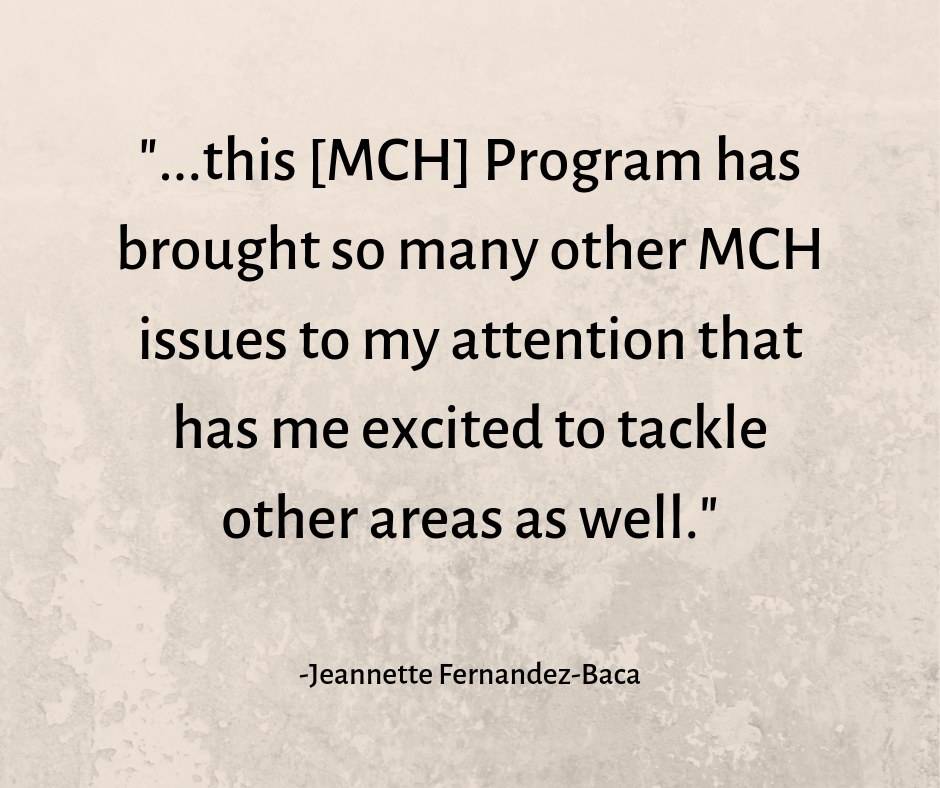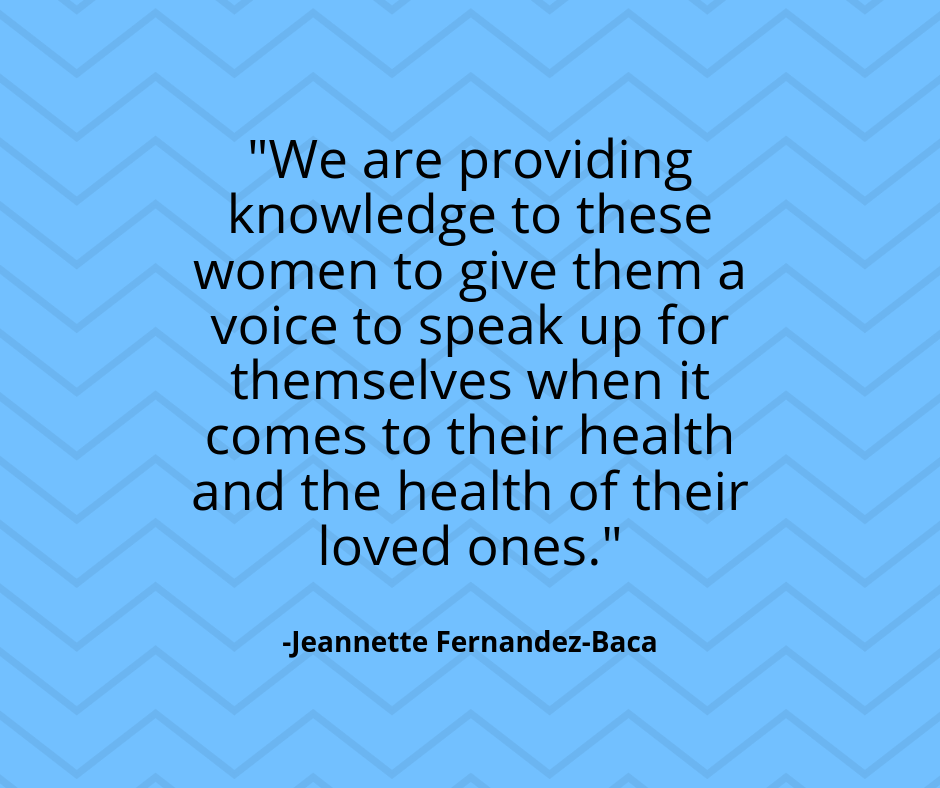This Student Spotlight series highlights the course experiences of students in the Incarceration & Health Course taught by Dr. Rebecca J. Shlafer. Other parts of the series include reflections from: Bri Warren, Hannah McNamee, Martha Johnson, and Rachael Mills. following piece is a reflection written by Jeanette Fernandez-Baca about her MCH experiences and what she learned in the course.
 What I love about public health is that it focuses on populations, not on individuals. Although I love helping others, I realized that working in public health would mean that I could help many more individuals by working at the population level. The Maternal and Child Health Program at the University of Minnesota School of Public Health has fueled my passion for helping others. A few of my passions are evaluation, health equity and family health. I came here thinking I wanted to work in maternal mental health, but this Program has brought so many other MCH issues to my attention that has me excited to tackle other areas as well.
What I love about public health is that it focuses on populations, not on individuals. Although I love helping others, I realized that working in public health would mean that I could help many more individuals by working at the population level. The Maternal and Child Health Program at the University of Minnesota School of Public Health has fueled my passion for helping others. A few of my passions are evaluation, health equity and family health. I came here thinking I wanted to work in maternal mental health, but this Program has brought so many other MCH issues to my attention that has me excited to tackle other areas as well.
About the Project and the Curriculum
I am currently working on a project with 6 other graduate students, under Dr. Rebecca Shlafer, that provides classes on women’s health to women that are currently incarcerated. I heard about this amazing opportunity through an email sent out by Dr. Rebecca Shlafer, looking for interested public health graduate students wanting to develop and facilitate a women’s health literacy curriculum in one of Minnesota’s prisons. It also included taking part in her Mass Incarceration and Public Health course that would give us an abundance of background on the prison system and how it relates to public health. During that course, we got to tour a few facilities and meet some individuals who reside there. It was eye-opening and a priceless experience.
My Role in the Project
This is a 3-step process including curriculum development, facilitation, and evaluation. We are currently in the facilitation and evaluation stages. We began developing a 12-week health literacy curriculum, based off a pre-existing 10-week curriculum that was developed for a correctional facility in another state. We used that as the base and turned it into something we feel is well-rounded, with more topics and more depth. This was something I’ve never done before, so it was exciting to experience curriculum development first-hand and with such an awesome group of fellow graduate students. 
Currently, we are facilitating this weekly curriculum with 15 inquisitive and competent women who are currently incarcerated. They have made me laugh, think deeper, and just be in the moment with those around me. I was so nervous to not only facilitate the class, but to do it in a prison setting. The women have challenged me in ways I wasn’t expecting: they are down-to-earth, and make me feel like I am making a difference for them and those they share this information with.
I currently oversee the evaluation step in this process. I developed a 5-question survey that covers their experience and created a spreadsheet containing all the feedback we collect each week. With their responses, we can uncover what is helpful and what needs improvement. This feedback leads us to reflect and make improvements on the curriculum and address areas that need coverage, so we can continuously improve our program.
What I’ve Learned
There are many aspects about this work that I see benefiting MCH populations. We are providing knowledge that is helping women use their voices to speak up for themselves when it comes to their health and the health of their loved ones. In this case, knowledge is power. It allows them to make healthier decisions when it comes to a range of areas from nutrition and oral health to safer sex and family planning and much more. They will hopefully feel more empowered to seek physical and mental health services and stand up for themselves against the systems that encompass so much structural inequity. Hopefully, seeing these women advocate for themselves will lead to their children or loved ones participating in self-advocacy in return.
What surprised me the most about this experience is how comfortable I am in this setting. Before I began this project, I was terrified of the idea of entering a prison. I never thought I would step foot in one until I signed up for this experience. I signed up because, a couple of years ago, I had the opportunity to participate in a program called Mommy Reads, where volunteers take a children’s book and a voice recorder into a women’s prison. They record mothers and grandmothers reading a book, then take the book and recording to the child so they have the comfort of hearing their mother or grandmother read them a story.
hearing their mother or grandmother read them a story.
I wanted to participate in the course, but I was held back by my own fear. When I saw the email from Dr. Shlafer about this opportunity, I decided I wanted to stand up to my fear so that I can make a difference while challenging myself and my perceptions. I never want my fear to stand in the way of helping others.
Challenges, Findings and Conclusions
Although this experience has been good in many ways, it has come with challenges. For instance, the prison system works on a strict schedule. There are certain blocks of time to check in, set up the room, and facilitate. This means that on days where the weather would cause a longer commute, we must leave early to make it in time. If we are late, we are refused entry and the class must sit in the room for two hours with nothing to do. We have also been made aware of how flexible this project needs to be. We designed our curriculum for 12 weeks, but already we have had 2 weeks not work, meaning we have had to figure out how to condense from 12 to 10 weeks. This has been a challenge, because we want to provide them a breadth of information that gets limited when this happens.
With all the positive aspects and all the challenges, this experience has exceeded my expectations. It has opened my eyes and heart, allowed me to try new things, and challenge myself. I am so thankful that I get to be a part of this amazing project.
Jeannette is a second year MCH student in the UMN, minoring in Sexual Health. She received her Bachelor of Arts in Sociology at the University of Florida, minoring in Family, Youth, & Community Sciences and her Associate of Arts in Biology at Santa Fe College. Currently, she volunteers as a Violence Prevention Educator with the Aurora Center for Advocacy and Education and as the MCH student representative for the Division Training Committee.
Read Student Spotlight Archives
Interested in learning more about getting a degree in Maternal and Child Health? Visit our MCH Program page for more information.
#UMNMCH #UMNproud #UMNdriven